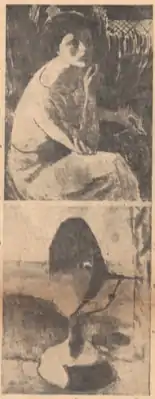Ximena Cristi
Lucía Ximena Cristi Moreno (December 13, 1920 – July 21, 2022) was a Chilean post-impressionist and figurative expressionist painter.[1] Alongside the artists Olga Morel and Aída Poblete, she is recognized for her work to convey "the worlds and perspectives of feminine expression."[2]
Biography

Ximena Cristi was born in Rancagua, Chile, in 1920.[3] For six years beginning in 1939 she studied at the Arts Faculty of the University of Chile, majoring in painting and graduating with a bachelor's in visual arts.[3] While at the university she studied under the painter Jorge Caballero, who influenced her artistic development.[5]
Cristi became part of the "generación de 1940" ("generation of 1940"), an artistic movement in Chile that also included Francisco Otta, Israel Roa, Aída Poblete, Ernesto Barreda, and Carlos Pedraza. This group, which was influenced by the likes of Pablo Burchard, Camilo Mori, and Luis Oyarzún, practiced a style similar to fauvism.[6]
Later on, thanks to a scholarship from the Italian government, Cristi traveled to Italy to study at the Accademia di Belle Arti di Roma from 1948 to 1952.[1]
In 1953, she joined with Matilde Pérez, Aída Poblete, Sergio Montecinos, and Ramón Vergara to form the "Grupo de los cinco" ("Group of Five"). This group, which stemmed from a joint exhibition that the artists staged at the Chilean-French Cultural Institute, reflected an inconformity with the traditional mediums of pictorial representation. They dedicated themselves to experimenting with new ways of artistic creativity.[7] While they did not all work in a cohesive style, the five artists shared similar ideas about the reality of the painting, which they saw as corresponding to a balance of forms rather than to visual reality.[5]
She was also a member of the "Rectángulo" ("Rectangle") group alongside Gustavo Poblete, Ramón Vergara Grez, Matilde Pérez, Elsa Bolívar, Maruja Pinedo, and Uwe Grumann. The group's members based their work on geometric and abstract forms, and they maintained that "art is an art of ideas."[8]
Cristi also taught art, including as a professor of painting at her alma mater, the University of Chile, from 1960 to 1982.[3]
In 2020, to mark her 100th birthday, the Chilean undersecretary of culture and art launched a project to research and study the work of Ximena Cristi, which culminated in the publication of a book titled Catálogo de obra razonada ("Catalog of Reasoned Work") in 2022.[9][10] Cristi died in July 2022 at the age of 101.[4]
Work
According to Cristi, her inspiration always came from nature: "If I have a still life, a chair, an object, or a tree, it's very objective, very real, born from there."[11] While she applied her personal vision to her paintings, she acknowledged that she never painted from her imagination, always using something objective as her guide. Her work is primarily based on interiors, gardens, still lives, and human figures.[12] Some of her signature works can be found at the Chilean National Museum of Fine Arts, including Jugadores de rugby, El árbol del jardín, and Sillón de espaldas.[13] Other works are featured at the Casa del Arte, Museum of Visual Arts, and various other museums and private collections.[3]
Among more than a dozen awards received throughout her career are, notably, the Altazor Award in 2011[14] and the Pablo Neruda Order of Artistic and Cultural Merit in 2022.[15]
References
- Dominguez, M. Teresa (2012-10-12). "Ximena Cristi, pintora" (PDF). Hacer familia (in Spanish). 31.
- América : territorio de transferencias (in Spanish). Marcela Drien, Fernando Guzmán Schiappacasse, Juan Manuel Martínez Silva, Museo Histórico Nacional (1st ed.). Santiago de Chile: Dirección de Bibliotecas, Archivos y Museos. 2008. ISBN 978-956-7297-02-3. OCLC 277275699.
{{cite book}}: CS1 maint: others (link) - "Ximena Cristi". Artistas Visuales Chilenos (in Spanish). Retrieved 2022-12-08.
- Opazo (2022-07-22). "Luto en las artes visuales: A los 101 años partió Ximena Cristi, destacada pintora chilena". El Ciudadano (in Spanish). Retrieved 2022-12-08.
- "Vida de Ximena Cristi". Portal del Arte (in Spanish). Archived from the original on 2017-03-09.
- "Generación del 40". Artistas Visuales Chilenos (in Spanish). Retrieved 2022-12-08.
- "Grupo de los Cinco". Artistas Visuales Chilenos (in Spanish). Retrieved 2022-12-08.
- "Grupo Rectángulo". Memoria Chilena, Biblioteca Nacional de Chile (in Spanish). Retrieved 2022-12-08.
- "Ximena Cristi: Catálogo de obra razonada". Ministerio de las Culturas, las Artes y el Patrimonio (in Spanish). 2022-01-26. Retrieved 2022-12-08.
- "Los 100 años de Ximena Cristi: publican libro que recopila su trabajo". La Tercera. 2022-01-25. Retrieved 2022-12-08.
- "Entrevista a Ximena Cristi: "Mi talento innato es la sensibilidad del color"". Pluma Y Pincel (in Spanish). 2011-07-13. Archived from the original on 2011-11-09.
- "Trayectoria de Ximena Cristi". Portal del Arte (in Spanish). Archived from the original on 2017-03-09.
- "MNBA celebra el centenario de Ximena Cristi". Museo Nacional de Bellas Artes (in Spanish). 2020-12-18. Retrieved 2022-12-08.
- "La artista Ximena Cristi recibió el premio Altazor 2011". Universidad de Chile. 2011-06-03. Retrieved 2022-12-08.
- Silva, Marcelo (2022-01-25). "Ministerio de las Culturas entrega reconocimiento a Ximena Cristi por su destacada trayectoria en las artes visuales". Emol (in Spanish). Retrieved 2022-12-08.